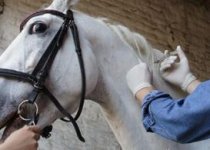♘امیرحسین♞
♘ مدیریت انجمن اسب ایران ♞
The health of a horse is often dependent upon the vigilance of its owner. Spotting problems early and acting quickly to sort things out are the keys to maintaining physical condition. However, although most horse owners should be able to cope with minor injuries or health problems, there are times when the expertise of a veterinary surgeon will be needed. If you are in any doubt as to whether your horse has a problem, it is always better to telephone your vet and ask for advice, rather than wait until a situation has developed into a more critical stage.
For your own piece of mind, make sure your knowledge of horse care is up to date. Read as many books and articles as you can on common complaints and illnesses, so that you are able to spot early signs of trouble.
If you have to make an emergency call, you may well be feeling quite stressed and unable to think as clearly as normal. Knowing what to do beforehand will make you feel more in control and able to cope.
One of the most important items in your first aid kit is undoubtedly your vet’s telephone number. In an emergency the last thing you need is to be panicking looking for the number, so keep it by the yard telephone, and stuck to the lid of your first aid box, as well as programmed into your mobile. This is particularly important if your horse is on a large yard where different people may use different veterinary surgeons.
In addition, write down the name, address and exact location of your yard so that you are able to give precise directions if needed. A new vet or a locum may not be aware of where you are based, so having the directions handy will save a lot of time as you try and explain.
It can be useful to pin an annotated picture of a horse’s anatomy on to your tack room wall. When there’s been an accident it’s easy for your mind to go blank and being able to refer to exactly where an injury has occurred will help you explain to the vet what has happened.
It’s important to try and remain calm in an emergency, speaking slowly and clearly. It may not be possible for you to speak to a vet immediately, and you may have to explain the situation to a veterinary nurse or receptionist first. Describe what is wrong with the horse, how long he has been ill, and where exactly the horse is. Give clear directions, and contact telephone numbers where you can be reached – including your mobile number as your vet may need to call you from his car to give advice or to ask for more directions.
Some situations should always be treated as emergencies. Colic, serious wounds and foaling difficulties are the most common calls that vets receive needing immediate attention. Other emergency situations include azoturia, acute laminitis, respiratory problems, choke, tetanus, severe lameness or fractures, eye injuries or infections and collapse.
If you suspect a serious problem, act quickly and decisively and your horse will stand a much better chance of making a full recovery.
For your own piece of mind, make sure your knowledge of horse care is up to date. Read as many books and articles as you can on common complaints and illnesses, so that you are able to spot early signs of trouble.
If you have to make an emergency call, you may well be feeling quite stressed and unable to think as clearly as normal. Knowing what to do beforehand will make you feel more in control and able to cope.
One of the most important items in your first aid kit is undoubtedly your vet’s telephone number. In an emergency the last thing you need is to be panicking looking for the number, so keep it by the yard telephone, and stuck to the lid of your first aid box, as well as programmed into your mobile. This is particularly important if your horse is on a large yard where different people may use different veterinary surgeons.
In addition, write down the name, address and exact location of your yard so that you are able to give precise directions if needed. A new vet or a locum may not be aware of where you are based, so having the directions handy will save a lot of time as you try and explain.
It can be useful to pin an annotated picture of a horse’s anatomy on to your tack room wall. When there’s been an accident it’s easy for your mind to go blank and being able to refer to exactly where an injury has occurred will help you explain to the vet what has happened.
It’s important to try and remain calm in an emergency, speaking slowly and clearly. It may not be possible for you to speak to a vet immediately, and you may have to explain the situation to a veterinary nurse or receptionist first. Describe what is wrong with the horse, how long he has been ill, and where exactly the horse is. Give clear directions, and contact telephone numbers where you can be reached – including your mobile number as your vet may need to call you from his car to give advice or to ask for more directions.
Some situations should always be treated as emergencies. Colic, serious wounds and foaling difficulties are the most common calls that vets receive needing immediate attention. Other emergency situations include azoturia, acute laminitis, respiratory problems, choke, tetanus, severe lameness or fractures, eye injuries or infections and collapse.
If you suspect a serious problem, act quickly and decisively and your horse will stand a much better chance of making a full recovery.

